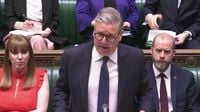A political row has erupted over the UK’s newly-announced trade deal with India, which includes a controversial exemption from National Insurance contributions for certain Indian workers. Critics argue that this concession could undercut British workers, while government officials insist it will not.
The trade deal, which has been in negotiation for over three years, aims to facilitate easier trade between the UK and India by reducing tariffs on various goods. Tariffs on whisky and gin exported to India from the UK will be halved from 150% to 75%, before further reducing to 40% by the tenth year of the deal. Additionally, car tariffs will drop from over 100% to 10% under a quota. The UK government claims this agreement is expected to boost bilateral trade by £25.5 billion, increase UK GDP by £4.8 billion, and raise wages by £2.2 billion annually in the long run.
However, the exemption from National Insurance contributions for some Indian workers has sparked significant controversy. The exemption is part of a reciprocal Double Contributions Convention (DCC) that applies to employees from firms with operations in both the UK and India, who are temporarily seconded from one country to another. This means that Indian workers will not have to pay National Insurance contributions for up to three years, while British workers sent to India will enjoy the same benefit.
Conservative leader Kemi Badenoch MP expressed her concerns, labeling the deal as creating “two-tier taxes.” She claimed that she had previously refused to sign off on a similar agreement during her tenure as business and trade secretary. Liberal Democrat deputy leader Daisy Cooper echoed these sentiments, stating that the deal “risks undercutting British workers.”
Reform UK leader Nigel Farage also criticized the agreement, asserting that it makes it “20% cheaper to hire Indians than British people.” He accused the government of having “sold out British workers to the highest degree.”
In response to the criticism, Business Secretary Jonathan Reynolds firmly denied that UK workers would be undercut as a result of the deal. He told the BBC, “There is no situation where I would ever tolerate British workers being undercut through any trade agreement we would sign. That is not part of this deal.” At Prime Minister’s Questions on May 7, 2025, Labour leader Keir Starmer defended the agreement, dismissing the claims about the National Insurance exemption as “incoherent nonsense.”
While the government has not yet published a detailed impact assessment regarding the exemption, it has estimated that the deal may cost the UK around £100 million a year. Critics have raised concerns that this could lead to a significant number of Indian workers being hired over British counterparts, especially in sectors where skilled labor is in high demand.
Despite these fears, the UK government insists that the deal will benefit British jobs and create new opportunities. Reynolds noted that the agreement would ultimately add £900 million to the UK economy each year, compared to £200 million for India. The DCC arrangement, which is not unique to this trade deal, is already in place with around 50 other countries, including Chile, Japan, and South Korea.
The Indian government has welcomed the National Insurance exemption, claiming it will lead to substantial financial gains for Indian service providers and enhance their competitiveness in the UK market. Indian trade body Nasscom described the inclusion of the DCC as a “big win,” asserting that it will significantly boost opportunities and make the UK a more attractive destination for investments.
However, the overall impact of the exemption remains unclear, as firms bringing secondees to the UK will still face various other costs. A partner at immigration services firm Vialto Partners commented that while the exemption may help firms that need specialized staff for specific projects, it would not necessarily lead to savings due to these additional costs.
As the government continues to navigate the complexities of this trade deal, the political ramifications are becoming increasingly pronounced. The opposition parties are leveraging the National Insurance exemption to question the government’s commitment to protecting British workers, raising concerns about immigration and the potential for job losses in the UK.
In the backdrop of these debates, the UK-India trade deal has been portrayed as a significant step in the post-Brexit landscape, with hopes of fostering closer economic ties. However, the contentious issue of tax exemptions for foreign workers may overshadow the potential benefits of the agreement.
Trade Minister Jonathan Reynolds emphasized that the changes would affect only a “very small number” of people, and he urged critics to consider the broader context of the trade deal. He stated, “If people like Nigel Farage cannot support the biggest trade deal since Brexit, who do they want to do trade with if it’s not the Europeans, the Chinese, or the Indians?”
While the government has touted the deal as a major achievement, the ongoing debate about the implications of the National Insurance exemption continues to fuel tensions among lawmakers. With the trade deal not yet signed and expected to take up to a year to come into effect, the political landscape surrounding it remains fluid.
As negotiations and discussions unfold, the UK public will be watching closely to see how this trade deal shapes the future of employment and labor markets in the country, and whether it truly delivers on its promises of economic growth and job creation.





